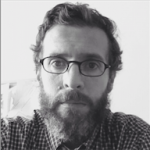Loneliness and Faith – A Personal Rumination
Years ago, in the Beit Midrash of the Hesder Yeshiva of Shilo, while feeling out of place in yet another context I had put myself into, I started a havruta with one of the rabbis there – subject of our study sessions was “The Lonely Man of Faith” by Rav Joseph B. Soloveitchik. The words I read and discussed with my teacher still echo in my daily religious experience. Humbly I wish to reiterate the Rav’s three-word sentence in this piece, with a short poem I wrote this summer. But first things first: “I am lonely.”
Let me emphasize, however, that by stating “I am lonely” I do not intend to convey to you the impression that I am alone. I, thank God, do enjoy the love and friendship of many. I meet people, talk, preach, argue, reason; I am surrounded by comrades and acquaintances. And yet, companionship and friendship do not alleviate the passional experience of loneliness which trails me constantly.
I am lonely because at times I feel rejected and thrust away by everybody, not excluding my most intimate friends, and the words of the Psalmist “My father and my mother have forsaken me” ring quite often in my ears like the plaintive cooing of the turtledove. It is a strange, alas, absurd experience engendering sharp, enervating pain as well as a stimulating, cathartic feeling. I despair because I am lonely and, hence, feel frustrated. On the other hand, I also feel invigorated because this very experience of loneliness presses everything in me into the service of God. In my “desolate, howling solitude” I experience a growing awareness that, to paraphrase Plotinus’ apothegm about prayer, this service to which I, a lonely and solitary individual, am committed is wanted and gracefully accepted by God in His transcendental loneliness and numinous solitude.”
These moments of loneliness are unbearable. In those moments, prayer is a monologue, an unanswered string of words addressed to a silent addressee. The Rav writes that the “role of the man of faith” has always been difficult since the beginning – because, he elucidates, “religious experience is fraught with inner conflicts and incongruities,” as the man of faith is perpetually condemned to a quasi-Sisyphic oscillation “between ecstasy in God’s companionship and despair when he feels abandoned by God.” At the time it felt cathartic – right there, on paper, one the greatest modern Halachic authorities confessed to his reader that he was torn apart by this oscillation. Loneliness / Communion.
As far as my religiosity is concerned, the last three years have been arduous. And I am most certainly still caught in that void separating loneliness from communion, torn apart by that silent interlocutor. And as the Rav wrote, “I have no problem-solving thoughts… I do not intend to suggest a new method of remedying the human situation which I am about to describe; neither do I believe that it can be remedied at all.” All I would like to do is share with you a poem I wrote this summer, in which I tried to express and crystallize that feeling.
The Actor and the Action
Sitting in the sukkah of myself
To be the thatch and wall
Willow
Myrtle
And lulav.
I am not the fruit of a goodly tree.
I pray from me to myself,
I enwrap me in myself,
I lay my voice upon myself
As a crown on my head.
To be my head
And the prayers bound on my head
My hand
And the prayers bound on my hand.
A siddur gapes at me.
I read it
And am read.
The two faces of the havruta,
Contemplate each other
Narrator and story
Father and son,
Myself and I.
I am close to those who call on me,
Whenever I call,
When I call in truth.
Will I hear my supplication?
A man grasps an object
Alone and unwilling
I lay myself upon my hand
I tie myself in leather straps.
And contemplate myself in a mirror.
העושה והמעשה
לישב בסוכה שהיא אני
להיות סכך ודופן
ערבה
הדס
ולולב
פרי עץ הדר, אינו אני
מתפלל ממני אליי
ומתעטף בעצמי
מניח את קולי על כולי
עיטור של ראש
להיות ראש
בית של ראש
להיות יד
בית של יד
סידור נפער לפניי
אני קורא
ונקרא
שני פני החברותא
מביטים זה בזה
מְסַפֵּר וסיפור
אב ובן
אני ואנוכי
קרוב אני לכל קוראיי
בכל עת אשר שאקרא
אשר אקרא באמת.
האשמע את שוועתי
גברא אוחז בחפצא
לבד ובעל כורחי
מניח את עצמי על ידי
כובל ברצועת העור סביב עצמי
ומביט בעצמי במראה
*Yaakov Mascetti holds a Ph.D. and teaches at the Department of Comparative Literature, Bar Ilan University.

